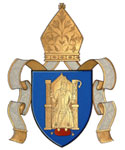 |
 |
News
Church leaders endorse reconciliation work of the Ulster Project
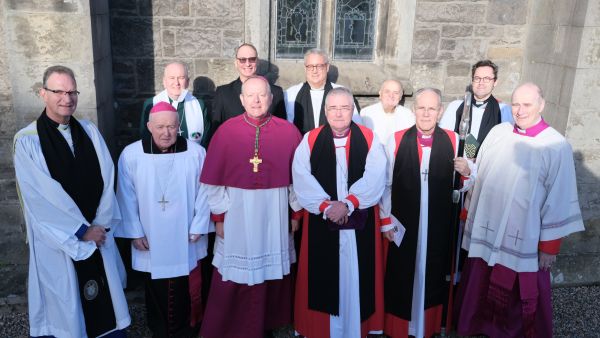
Clergy taking part in the Service.
The leaders of the main churches in Ireland have attended a Service of Thanksgiving to mark 50 years of the Ulster Project hosted jointly by St. Macartin’s Cathedral and St. Michael’s Church in Enniskillen.
The Ulster Project established in 1975 brought Protestant and Roman Catholic teenagers from Northern Ireland for month-long stays with host families in the United State at the height of the Troubles. Over the 50 years, it is estimated that 25,000 young people have participated.
The service began in the Cathedral and halfway through everyone followed the choir as they processed across the street to continue the service in St. Michael’s Church while singing “Peace is flowing like a river.”
Officiating at the service were the Church of Ireland Archbishop of Armagh and Primate of All Ireland, Most Revd John McDowell and the Roman Catholic Archbishop of Armagh, the Most Revd Eamon Martin as well as the two Bishops of Clogher, the Right Revd Dr. Ian Ellis and Most Revd. Larry Duffy.
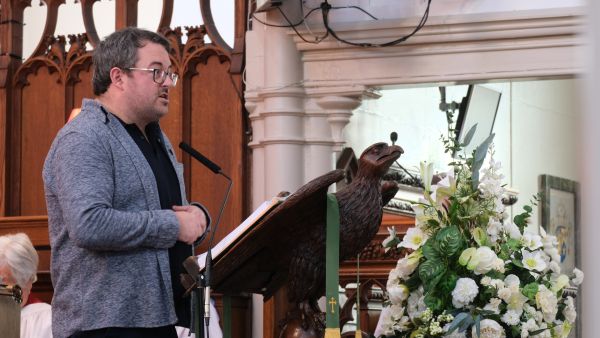
James McLoughlin Ulster Project Enniskillen.
Dean Kenneth Hall conducted the service in the Cathedral and Monsignor Peter O’Reilly led the service in St. Michael’s Church.
The procession of banners and placing of the Ulster Project symbols took place during the singing of the first hymn, “In Christ there is no east or west.”
Following a welcome from Dean Hall, an introduction to the Ulster Project was given by James McLoughlin, from the Ulster Project in Enniskillen.
He said the Ulster Project began as a result of work of a small group of people led by visionary founders, Revd Kerry Waterstone and his wife, Edie who ministered in Tullamore, Co. Offaly.
During the service, a plaque on the wall in the Cathedral was unveiled by Mr. Aidan Waterstone, a son of Revd Kerry and Edie Waterstone and jointly dedicated by Dean Hall and Monsignor O’Reilly.
A lesson was read by Arthur Rainey, from the Ulster Project in Omagh with Prayers of Thanksgiving read by Laura Richmond, Ulster Project Enniskillen; Aidan Waterstone; Gavin Robinson, past teen participant in the Belfast Milwaukee exchange in 2000; Maureen Stacier, from the Ulster Project, Madison, Indiana; Eoin Tennyson, past teen participant, Portadown Hutchinson 2014 exchange and Mario Gribbon, Portadown co-ordinator and past teen participant in Portadown Manchester 1975.
In St. Michael’s Church, Aideen McDonnell, a 2025 participant in the Enniskillen Madison exchange, gave an account of her story on the Ulster Project.
A reading was given by Canon John Forsythe, Chair of the Ulster Project NI Leadership Committee.
In St. Macartin’s Cathedral, the address was given by Archbishop John McDowell while in St. Michael’s, the address was given by Archbishop Eamon Martin.
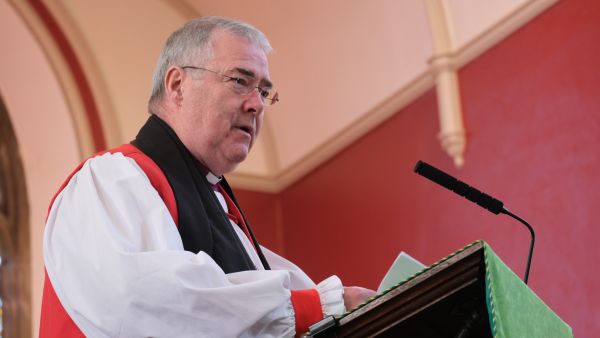
Archbishop John McDowell preaching in St. Macartin's Cathedral.
Archbishop John McDowell in his address in St. Macartin's Cathedral, said that he got to know about the Ulster Project well when he was Bishop of Clogher and he always felt it was very close to people’s hearts in Fermanagh.
He said; “Over the past 50 years the Ulster Project has helped transform many young lives through the co-operation of a great number of quiet people - host families, volunteers and leaders. Today is the feast of All Saints and it seems particularly fitting that we should give thanks for the lives of all of those people who gave some part of themselves to make this reconciliation initiative a success, but who are no longer with us, but who rest in God’s nearer presence.
“There is one crucial difference between the reconciliation which they and their successors (many of you here in this Cathedral today) have worked so hard to bring about and the full meaning of the word in that passage from St Paul.
“In the Gospel Paul was not offering good advice. He was offering good news. His message was that in Jesus Christ God’s reconciliation of the world to himself was complete and it was left to the world to receive it or reject it.
“You in the Ulster Project have been making a slightly different offer. You have been saying to young people that the work of reconciliation in Northern Ireland is very far from complete, so come and help us and we will help you make it wider and deeper. To that extent the work which you have been involved in has been even more challenging than the work of St Paul.”
“The founders and their successors in the Ulster Project wisely adopted the methods of hospitality, encounter and ordinary friendship to achieve the goal of contributing to the building of a reconciled society. Love takes on many shapes in the world in order to achieve its ends and perhaps friendship is the most low-key, the least spectacular but the longest lasting. It requires many virtues --truth telling, vulnerability, endurance and patience. Friendship is fully realistic and takes into account the way the world is and has been. Friends know that in their relationships with each other and with the world in which they live there are hurts that cannot be forgotten; that lament and thanksgiving are never far apart.
“You are engaged in work for the long term, in fact work that is both unending and enduring. Yet it is also work that has a thousand satisfactions and hundreds of little victories each day - harsh words left unspoken, gestures of courage and understanding quietly offered. The love and laughter of friendship. A sorrow joyfully borne.
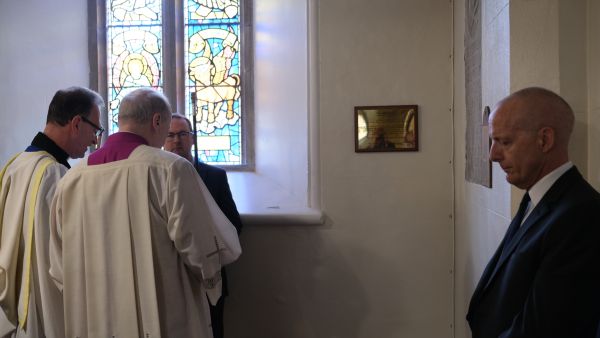
The plaque in memory of Revd Kerry Waterstone and Mrs Edie Waterstone is dedicated.
“And of course these things don’t just happen. In a society such as we have in NI the Ulster Project deserves continued support financially and in very practical ways by also supporting encounter programmes and committing to long-term accompaniment. Encouragement too for those of us in churches to continue to partner and to invest.
“But today is above all a day for celebration and gratitude. Celebration for all that has been achieved by way of young lives transformed and of gratitude to the many people who have made this possible. Above all, in this place, gratitude to the God and Father of our Lord Jesus Christ as we journey with him on the path of reconciliation which lies behind us and stretches out before us,” he added.
In St. Michael’s church, Archbishop Eamon Martin in his address, said; 'When we were marking the 25th anniversary of the Good Friday Agreement a few years ago, there was a definite sense of gratitude for those who had brokered the agreement, while at the same time, an acceptance that we still had a long way to go. It made me think of those words of W. B. Yeats, 'and I shall have some peace there, for peace comes dropping slow'.
'Yeats, of course, was writing about a different kind of peace and tranquility, as he dreamt about being back on the idyllic Inishfree island of his childhood, far from the grey pavements of London. Still, those poignant words speak to our “deep heart’s core” as we mark the golden anniversary of the Ulster Project. We’re thankful to God for all that has been achieved, but we’re also aware of the “unfinished work” of our peace.
'The Gospel passage we’ve just heard speaks of the coming of God’s kingdom in terms of sowing seeds; seeds that are sown in Hope, and reaped in Joy. The growth of those seeds, although sure and steady, largely happens “out of sight; out of mind”. “Night and day”, we’re told, “the seed sprouts and grows all by itself first the stalk, then the head, then the full kernel in the head” and then eventually, the harvest!
'Today we rightly celebrate the significant harvest of The Ulster Project in helping to ‘buildpeace and shape the future’ over the past 50 years. Many of those who participated look back on their experience as “life changing”, but the Project was never about quick fixes or instant results. Much of the Project’s success has been gradual, often “out of sight, out of mind”, but still, it has slowly but surely helped to transform many young Christians into respectful leaders and peacemakers, who have the confidence to make a difference.
'The prophetic founders and early supporters of The Ulster Project, on both sides of the Atlantic, knew that “peace comes dropping slow”, but they were determined to start somewhere. They were inspired by faith and Hope to ask again that Gospel question: “Who is my neighbour?”. They had a conviction that ultimately Good is stronger than Evil, love conquers hate, and even the smallest seed can sprout and grow into a great tree where people can gather and find shelter.
'The fruits of the Ulster project are therefore best found deep in the hearts and minds of its many past participants now “influencers” who have positively shaped attitudes and behaviours here, at first with their own family members and friends at school; later with their peers and colleagues, eventually teaching tolerance and respect to their own children, and now, for some, possibly even grandchildren!
'But the work of peacemaking remains far from over; as Archbishop John reminded us, we all share the responsibility to be ministers, ambassadors even, of reconciliation, healing and peace. We are under no illusions; this work is not easy, especially where pain and unresolved grief lingers; when progress is stalled by mistrust or even reversed by a kind of tribal politics that thrives in closed echo-chambers of suspicion and “whataboutery”. All the greater need then, for new prophets to emerge among us who can open up spaces to nurture empathy and dialogue, knowing that no-one has a monopoly of the wounds of our troubled past.
'The unfinished work of peace cries out for leadership on so many levels: including from churches, politicians, business people, educators, community and voluntary workers. We need more risk takers who can help us take courageous steps forward in the service of the common good. Where are they? I am confident that such leaders are out there, and many of them are numbered among the “graduates” of The Ulster Project; they remain our Hope for the present and the future.
'The work of peace-building will of course never be exhausted. The question “who is my neighbour?” will always be asked of us, but hopefully in time we will be able to see beyond the usual in-fighting and the old distinctions, labels and prejudices to realise that our love and responsibility cannot be reserved only for ‘our own kind’. There are so many other marginalised people out there lying largely unnoticed ‘at the side of the road’. They are our neighbours of all persuasions who are trapped in poverty; they are the vulnerable, sick and lonely, the shunned migrant, the tormented addict, the family torn apart by the scourge of domestic violence, the despairing young adult contemplating the taking of her or his own life. When we have the eyes to see this, and the determination as a society to do something significant about it, then we will know that our peace, which has been dropping slow, is at last maturing.
'The year 2025 is a ‘Jubilee Year’ in the Catholic Church, that is a special year of prayer and reflection which is called every quarter of a century. The theme of this Jubilee Year is “Pilgrims of Hope”, that Christian hope which St Paul described to the Romans as “the Hope that does not disappoint”.
'Of course 1975, the year in which The Ulster Project was founded, was also a jubilee year, and coincidentally the theme chosen back then was “Renewed in Hope”. So, The Ulster Project was born in Hope, and continues in Hope! My hope-filled prayer then is that this anniversary will re-energise among us a spirit of solidarity and generosity so that with God’s help, we can renew our determination to shatter the prejudices and stereotypes that keep us isolated and separate; to quicken the pace of peace; and to , create a society where it is normal to be pilgrim of Hope, build bridges, cross the road and recognise that the stranger over there is really our friend,' he added.
#4
Prayers for peace were read by Revd Alan Wardlow, President of the Methodist Church in Ireland; Irene Hewitt, Ulster Project Derry/Londonderry; Revd Gunther Andrich, representing the Moderator of the Presbyterian Church in Ireland; Sheryl Smith, Ulster Project Castlederg; John Hough, Ulster Project of East Tennessee and President of the US Steering Committee and Joy Greer, Ulster Project Cookstown.
The hymns in both the Cathedral and St. Michael’s were; “In Christ there is no east or west” and “Make me a channel of your peace.”
The service ended with closing remarks by Monsignor O’Reilly and with a joint blessing and dismissal from the two Bishops of Clogher.
#6#
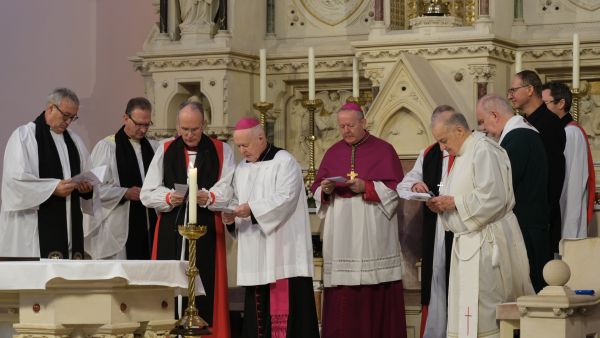
The blessing and dismissal in St. Michael's Church.
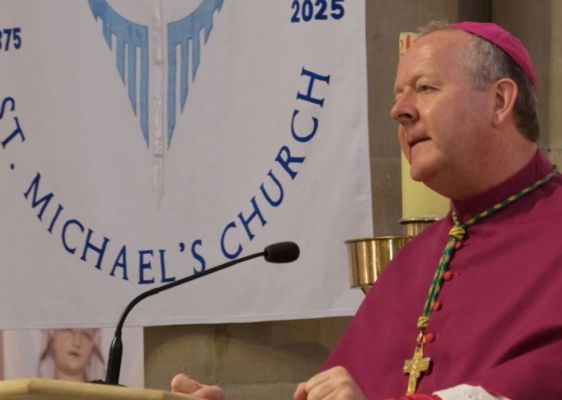
Archbishop Eamon Martin.